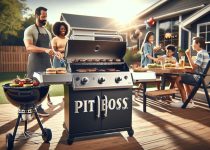Essential Safety Tips for Your Next BBQ Bash
Are you planning a BBQ bash?
Before you fire up the grill, make sure you know these essential safety tips.
Proper grill maintenance, safe food handling practices, and fire safety precautions are just a few things you need to keep in mind.
Don’t forget to handle propane tanks with care and create a safe cooking area.
Protect yourself and your guests from foodborne illnesses and manage outdoor hazards.
Get ready for a safe and enjoyable cookout!
Table of Contents
Key Takeaways
- Clean the grill thoroughly after each use to prevent grease buildup and fire hazards
- Keep raw and cooked foods separate at all times to prevent cross-contamination
- Keep a fire extinguisher nearby and know how to use it
- Store propane tanks in a well-ventilated area away from heat sources, open flames, and ignition sources
Proper Grill Maintenance
To ensure the safety and functionality of your grill, regularly perform proper maintenance on it.
One crucial aspect of grill maintenance is cleaning. Over time, grease buildup can occur, which can’t only affect the taste of your food but also pose a fire hazard. To prevent this, make sure to clean your grill thoroughly after each use.
Start by removing the grates and scrubbing them with a wire brush to remove any food particles or residue.
Next, clean the interior of the grill, including the burners and heat deflectors, using a grill cleaner or a mixture of warm soapy water.
Don’t forget to also clean the grease trap or drip pan to prevent any clogs or overflow.
Regularly inspect and clean the burner tubes for any blockages, as this can affect the performance of your grill.
Safe Food Handling Practices
When it comes to ensuring a safe and enjoyable BBQ experience, it’s important to prioritize safe food handling practices. One essential aspect of safe food handling is proper safe food storage. Make sure to store raw meat, poultry, and seafood in sealed containers or plastic bags to prevent any potential leakage, which can contaminate other foods in the refrigerator. It’s also crucial to keep these foods separate from ready-to-eat items like fruits and vegetables to avoid cross contamination.
Preventing cross contamination is another key element of safe food handling. This means keeping raw and cooked foods separate at all times. When using cutting boards or utensils, remember to wash them thoroughly with hot, soapy water after each use, especially when switching between raw and cooked foods. This will help prevent the transfer of harmful bacteria.
Additionally, be mindful of using separate plates and utensils for raw and cooked foods. Never reuse plates or utensils that have come into contact with raw meat or poultry without washing them first. This simple practice can significantly reduce the risk of foodborne illnesses.
Fire Safety Precautions
To ensure a safe and enjoyable BBQ experience, it’s crucial that you take fire safety precautions. Here are three important steps you should follow:
-
Keep a fire extinguisher nearby: Accidents can happen, so it’s important to have a fire extinguisher within reach. Make sure it’s fully charged and easily accessible. Familiarize yourself with how to use it properly before your BBQ event.
-
Create an emergency evacuation plan: In case of a fire emergency, it’s essential to have a plan in place. Identify exits and establish a meeting point for everyone to gather safely. Communicate the plan to all attendees beforehand, including children, so they know what to do in case of an emergency.
-
Practice safe grilling habits: Avoid placing your grill too close to any flammable materials, such as trees, fences, or your house. Ensure that the grill is stable and on a level surface. Never leave the grill unattended, and keep children and pets away from the grilling area.
Handling of Propane Tanks
How can you safely handle propane tanks during your BBQ bash? Proper handling of propane tanks is essential to ensure the safety of yourself and your guests. Here are some important tips to keep in mind when it comes to propane tank storage and transportation:
| Propane Tank Storage | Propane Tank Transportation |
|---|---|
| Store tanks in a well-ventilated area away from heat sources, open flames, and ignition sources. | Always transport propane tanks in an upright position to prevent leakage. |
| Keep tanks in an upright position and secure them with a safety strap or chain to prevent tipping over. | Avoid rough handling of propane tanks during transportation to prevent damage. |
| Do not store propane tanks indoors or in enclosed spaces, such as basements or garages. | Ensure that the valve on the tank is tightly closed and the protective cap is in place before transporting. |
| Check tanks regularly for signs of damage, such as dents, rust, or leaks. If any damage is found, do not use the tank and contact a professional for assistance. | Keep tanks away from direct sunlight and extreme heat during transportation to reduce the risk of overpressure. |
Ensuring a Safe Cooking Area
To ensure the safety of yourself and your guests, it’s important to create a safe cooking area for your BBQ bash by following these essential tips:
-
Grill Placement: Choose a suitable location for your grill. Make sure it’s placed in a well-ventilated area, away from any overhanging structures or flammable materials. Keep it at least 10 feet away from your house, deck, or any other combustible surfaces. This will minimize the risk of fires and ensure that everyone can move around the grill safely.
-
Equipment Maintenance: Regularly inspect and maintain your grill and cooking equipment. Check for any signs of wear and tear, such as rusted parts or loose connections. Clean the grill grates and remove any grease or debris that may have accumulated. Keep the grill clean and free from any potential hazards. This won’t only ensure safe cooking but also prolong the lifespan of your equipment.
-
Safe Handling of Fuel: If you’re using charcoal or propane, store them in a cool, dry place away from heat sources. Follow the manufacturer’s instructions for handling and storing fuel. When lighting the grill, always use long-handled tools and avoid wearing loose or flammable clothing. Remember to never leave the grill unattended while it’s in use.
Protecting Against Foodborne Illnesses
To protect yourself and your guests against foodborne illnesses, take necessary precautions when preparing and handling food at your BBQ bash. Proper food storage and preventing cross contamination are essential to ensure the safety of the food you serve. Follow these tips to minimize the risk of foodborne illnesses:
-
Food Storage: Store raw meat, poultry, and seafood separately from other food items to prevent cross contamination. Keep them in leak-proof containers, sealed plastic bags, or covered containers to avoid any contact with other foods. Place them on the bottom shelf of the refrigerator to prevent any drips onto other foods.
-
Cross Contamination: Use separate cutting boards and utensils for raw and cooked food to prevent cross contamination. Wash your hands thoroughly with soap and water before and after handling raw meat, poultry, or seafood. Clean and sanitize all surfaces and utensils that come into contact with raw food.
-
Safe Cooking Temperatures: Use a food thermometer to ensure that meat, poultry, and seafood reach the safe internal temperatures. Refer to the table below for the recommended minimum internal temperatures for different types of food:
| Food Item | Minimum Internal Temperature |
|---|---|
| Ground Meat | 160°F (71°C) |
| Poultry | 165°F (74°C) |
| Pork | 145°F (63°C) |
| Seafood | 145°F (63°C) |
Managing Outdoor Hazards
Be aware of potential outdoor hazards and take necessary precautions to ensure a safe BBQ bash. When hosting an outdoor gathering, it’s important to consider the safety of your guests. Here are three essential tips to help you manage outdoor hazards and create a secure environment for everyone to enjoy:
-
Inspect and secure outdoor seating: Before your BBQ bash, thoroughly inspect all outdoor seating areas. Check for any loose or unstable chairs or benches that could pose a risk of accidents or injuries. Ensure that the seating is sturdy and stable, and if necessary, repair or replace any damaged furniture. Additionally, consider providing cushions or padding for added comfort and safety.
-
Take weather precautions: Outdoor events are susceptible to changing weather conditions. Keep an eye on the forecast and be prepared for potential hazards like strong winds, rain, or extreme heat. Provide ample shade options such as umbrellas, canopies, or tents to protect your guests from the sun. If rain is expected, have a backup plan for shelter, such as a covered patio or a nearby indoor area. It’s also a good idea to have mosquito repellent available to protect against insect bites.
-
Clear walkways and remove obstacles: Ensure that all pathways and walkways are clear of any potential hazards, such as loose steps, debris, or tripping hazards. Remove any obstacles that could cause accidents, such as toys, hoses, or gardening equipment. By keeping the outdoor space clutter-free, you can minimize the risk of falls or injuries.
Frequently Asked Questions
What Are Some Common Signs That Indicate a Propane Tank May Be Damaged or Unsafe to Use?
If you notice any dents, rust, or a strong odor of gas coming from your propane tank, it may be damaged or unsafe to use. Always prioritize propane tank maintenance and safe handling.
How Can I Prevent Cross-Contamination When Handling Different Types of Raw Meat at a Bbq?
To prevent cross-contamination when handling different types of raw meat at a BBQ, make sure to use separate cutting boards and utensils for each type. Also, wash your hands thoroughly after handling raw meat to avoid spreading bacteria.
Are There Any Specific Safety Precautions to Follow When Grilling in a Public Park or Campground?
When grilling in a public park or campground, there are specific safety precautions you should follow. Make sure to check if grilling is allowed, keep a safe distance from flammable objects, and dispose of charcoal properly.
What Should I Do if a Grease Fire Occurs While Cooking on the Grill?
If a grease fire occurs while cooking on the grill, remember to stay calm and don’t use water. Turn off the grill, cover it with a lid or baking sheet, and let it suffocate. Follow safety precautions for grilling in public spaces.
Are There Any Specific Steps to Take to Ensure a Safe Cooking Area When Grilling on a Balcony or Rooftop?
To ensure a safe cooking area when grilling on a balcony or rooftop, take steps for safe grilling in small spaces. Proper ventilation is essential to prevent the buildup of dangerous fumes.




